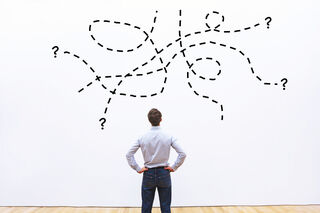False Memories
We Need Truth More Than Ever, but It's Elusive
We need truth to help us navigate this complicated world, but it's elusive.
Posted August 12, 2020

Note: This is the first post in a series on truth as it relates to societal problems we are experiencing. Disclaimer: I don't claim that what I say is totally "true," because the truth is elusive in this complicated world. Rather, I'm offering some ideas to help perceive the world, others, and ourselves in a manner that opens pathways for change and growth.
“It ain’t what you don’t know that gets you into trouble. It’s what you know for sure that just ain’t so.” —Mark Twain
We hear and read about "fake news," "alternative facts," media bias, conflicting news reports, and various conspiracy theories so much these days that we often don't know what to believe. Did Trump and his administration conspire with the Russians to win the 2016 election? Or is there a conspiracy by some far left groups to make it look like he did? What was in Hillary Clinton's private email server? What is in Trump's tax returns? Are humans really responsible for climate change and just how bad is it going to get? Why is COVID-19 more deadly for some people than others? The truth matters.
The Importance of Truth
“Nothing is so conducive to spiritual growth as this capacity for logical and accurate analysis of everything that happens to us.” — Marcus Aurelius, Meditations
This might seem like common sense, but knowing the truth, what is real, helps us to make skillful decisions so that we can function more effectively in this world. For example, we need to know what to get at the grocery store, when and where our kid's soccer game is, the date of our wedding anniversary, how to pay our bills, which medicine to take when we are ill, and so on.
Problems quickly arise when we don't have our facts straight. Consider that a builder who is unable to take accurate measurements is going to end up constructing a very wonky house. You’d rather not have your doctor erroneously remove your appendix when you merely have indigestion. We would not want our country to go to war based on flawed intelligence that we were about to be attacked by another nation. You wouldn’t want your partner to divorce you based on a mistaken belief that you are having an affair with your neighbor. We wouldn't want our government to waste taxpayer dollars on an expensive program designed to lower the recidivism rate of criminals if, in fact, it increases this rate. We wouldn't want to distribute a COVID-19 vaccine worldwide if it isn't effective or causes too many side effects.
When it comes down to it, we seek to know, to understand “reality” so that we can make wise, effective decisions in this world. This requires us to have fairly accurate information. Think of life as a journey, and we must navigate the road along this journey. If we cannot see the road because it is too dark, we will likely end up in the wrong place...or even crash! In this sense, the truth is like a beacon of light that dispels the darkness so that we might find safe passage.
The Elusive Concept of Truth
For being such a simple idea, truth is a lot more elusive than we'd like to think. People don't just disagree on what is true and what is false. We have different ideas about what "truth" even means. There is a certain irony about not being able to precisely define the very concept of truth. For example, when discussing this topic, people might use the words truth, reality, knowledge, accurate information, certainties, and facts as if such concepts are completely interchangeable, yet they aren't necessarily. One could say there are many views and opinions about how truth should be defined, which also goes to show that, like a willow-the-wisp, truth is difficult to capture!
As other evidence that truth is a slippery concept, it is likely true that you find exceptions to nearly everything in this blog series about truth. This blog post represents my views or opinions about the truth and, as such, they cannot be unequivocally "true." Nonetheless, we could say that it is "true" that I'm providing my opinions about truth.
You Think That's Air You're Breathing Now?
We could even identify truths that we initially agree upon that fall apart upon closer examination. For instance, we might agree that the chair you are sitting on is a solid object, yet it is made up of mostly empty space. Similarly, you likely feel that you are real — that you are here. But we humans, as with other tangible objects, are all mostly made up of empty space too. (Some of us more than others!) Thus, our "here-ness" is mostly made up of "not here-ness."
As for the object you are sitting on, when is it more proper to call a stool, bench, step, or loveseat a chair? Would that object be called something different entirely in another language? To someone from the past? The future? A different culture? How do I know that what tastes like chicken to you tastes the same to me? You think that is air you're breathing now?
We must be mindful that a percept occurs within the brain. Thus, any stimulus perceived "out there" (i.e., outside of our bodies) is experienced as something "real" as a result of a mysterious firing of electrochemical signals traveling through sense perceptions and interpreted by different clusters of neurons within our brains. In what is known as the hard problem of consciousness, neuroscientists are unable to explain how our perception of stimuli results in subjective experiences.
"What is real? How do you define 'real?' If you're talking about what you can feel, what you can touch, what you can taste and see, then 'real' is simply electrical signals interpreted by your brain." —Morpheus from the movie, The Matrix
From a quantum physics perspective, an objective reality might not even exist. What are considered physical objects are actually subjective realities created by the observer. Your head might be spinning a little as you wonder, "Just how deep does this rabbit hole go?"
"Do not try and bend the spoon, that's impossible. Instead, only try to realize the truth...there is no spoon. Then you'll see that it is not the spoon that bends, it is only yourself." - "Spoon Boy" from the movie, The Matrix
Striving for Certainty in a Complicated World
“Our new Constitution is now established, and has an appearance that promises permanency; but in this world nothing can be said to be certain, except death and taxes.” —Benjamin Franklin
As Benjamin Franklin observed, there are very few certainties in life. He even viewed our own Constitution as more of a work in progress rather than an immutable product. As discussed, even truths and realities that we usually take for granted as rock-solid, upon closer examination, are not really. We can't evenly definitively say that rocks are solid!
“We were certainly uncertain. At least, I’m pretty sure I am.” — "Missed the Boat" by Modest Mouse
Channeling some of the wisdom of Ben Franklin, we might say that it is “true” that there are very few certainties in life. Thus, when we seek to understand this world in which we live, we are primarily talking about finding relative truths (i.e., something is usually or mostly true) versus absolute truths (i.e., always true, in all instances).
Consider the wisdom found in pithy maxims. Which is true: “He who hesitates is lost” or “Haste makes waste?" Sometimes it is true that a cautious approach yields the best results, but at other times any hesitation could have fatal consequences. Truth can be found in each of these statements, but their "real" truth depends upon their skillful application.
As another truth about truth, we don't always seek the truth. As it turns out, truth serves a higher master. I will cover this topic in my next post and springboard into how many of our current societal problems are related to how we have difficulty using truth to navigate this complicated world.




